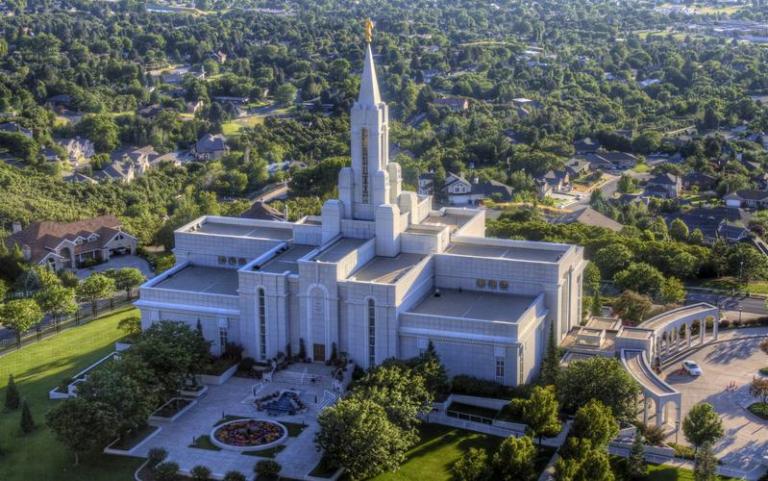
(LDS Media Library), very near the place where I’m currently typing
For what it’s worth, I’ll be on the Interpreter Radio Show tonight (Sunday night), from slightly after 7 PM until 9 PM, Utah time. The Interpreter Radio Show can be heard Sunday evenings from 7 to 9 PM (MDT), on K-TALK, AM 1640, or you can listen live on the Internet at ktalkmedia.com.
***
Throughout my childhood, and specifically during almost the entirety of my high school years, roughly when I was beginning to pay attention to the Church and to care about the claims of the Restoration, David O. McKay was the greatly revered president of the Church of Jesus Christ of Latter-day Saints. And, for much of that time, the Canadian attorney and former military officer Hugh B. Brown was his very impressive (and intellectually inclined) first counselor. It seemed — to a teenager — that they had been around forever and that they would be around forever. Here are some thoughts from President Brown on the matter of science and religion:
Both science and religion beget humility. Scientists and teachers of religion disagree among themselves on theological and other subjects. Even in our own church men and women take issue with one another and contend for their own interpretations. This free exchange of ideas is not to be deplored as long as men and women remain humble and teachable. Neither fear of consequence or any kind of coercion should ever be used to secure uniformity of thought in the church. People should express their problems and opinions and be unafraid to think without fear of ill consequences.
We should all be interested in academic research. We must go out on the research front and continue to explore the vast unknown. We should be in the forefront of learning in all fields, for revelation does not come only through the prophet of God nor only directly from heaven in visions or dreams. Revelation may come in the laboratory, out of the test tube, out of the thinking mind and the inquiring soul, out of search and research and prayer and inspiration. We must be unafraid to contend for what we are thinking and to combat error with truth in this divided and imperiled world, and we must do it with the unfaltering faith that God is still in his heaven even though all is not well with the world.
We should be dauntless in our pursuit of truth and resist all demands for unthinking conformity. No one would have us become mere tape recorders of other people’s thoughts. We should be modest and teachable and seek to know the truth by study and faith. There have been times when progress was halted by thought control. Tolerance and truth demand that all be heard and that competing ideas be tested against each other so that the best, which might not always be our own, can prevail. Knowledge is the most complete and dependable when all points of view are heard. We are in a world of restlessness and skepticism, where old things are not only challenged but often disappear, but also a world of miraculous achievement, undreamed of accomplishment, and terrifying power.
Science offers wonderful tools for helping to create the brotherhood of humanity on earth, but the cement of brotherhood does not come from any laboratory. It must come from the heart and mind and spirit of men and women.
Peace and brotherhood can be achieved when the two most potent forces in civilization — religion and science — join to create one world in its truest and greatest sense. We should continue to become acquainted with human experience through history and philosophy, science and poetry, art and religion. Every discovery of science reveals clearly the divine plan in nature. The remarkable harmony in the physical laws and processes of the universe, from the infinitesimal to the infinite, surpasses mortal understanding and implies a supreme architect, and the beauty and symmetry of God’s handiwork inspire reverence.
One of the most important things in the world is freedom of the mind; from this all other freedoms spring. Such freedom is necessarily dangerous, for one cannot think right without running the risk of thinking wrong, but generally more thinking is the antidote for the evils that spring from wrong thinking.
More thinking is required, and we should all exercise our God-given right to think and be unafraid to express our opinions, with proper respect for those to whom we talk and proper acknowledgment of our own shortcomings. We must preserve freedom of the mind in the church and resist all efforts to suppress it. The church is not so much concerned with whether the thoughts of its members are orthodox or heterodox as it is that they shall have thoughts. One may memorize much without learning anything. In this age of speed there seems to be little time for meditation.
While speaking of independence and the right to think, to agree or disagree, to examine and question, I need to remind myself not to forget that fixed and unchanging laws govern all God’s creation, whether the vastness of the starry heavens or the minute revolving universe of the atom or human relationships. All is law. All is cause and effect, and God’s laws are universal. God has no favorites; no one is immune from either life’s temptations or the consequences of his or her deeds. God is not capricious.
(Hugh B. Brown, “A Final Testimony,” from Edwin B. Firmage, ed., The Memoirs of Hugh B. Brown: An Abundant Life [Salt Lake City: Signature Books, 1988])
***
Get your anti-coronavirus shot!
***
This may help to explain the sad situation of some of my fiercer critics:
“Frequent cannabis use by young people linked to decline in IQ”
***
And, finally,
“Planned Parenthood Takes Credit For Extinction Of The Dinosaurs”
Posted from Bountiful, Utah












